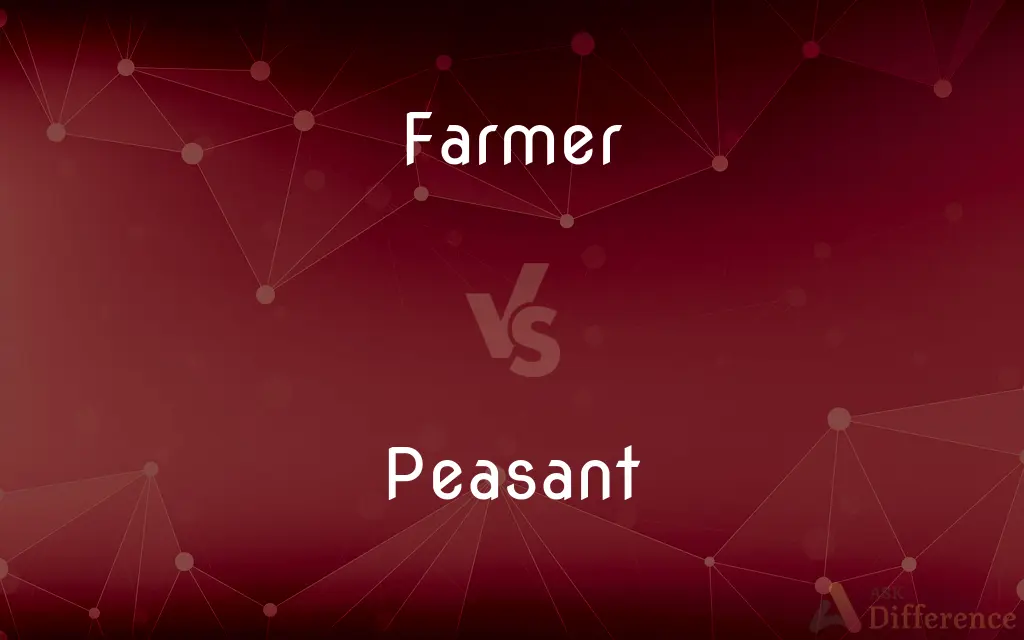Farmer vs. Peasant — What's the Difference?
By Tayyaba Rehman & Fiza Rafique — Updated on February 26, 2024
A farmer is someone who owns or manages a farm, focusing on agriculture to produce food and other crops. A peasant is a small-scale farmer with limited land and resources, often associated with traditional, rural lifestyles and economies.

Difference Between Farmer and Peasant
Table of Contents
ADVERTISEMENT
Key Differences
Farmers are individuals who engage in agriculture, raising living organisms for food or raw materials. Peasants, historically defined, are smallholder or subsistence farmers who primarily rely on manual labor and traditional farming methods.
Farmer may own their land or work on leased properties, utilizing modern agricultural techniques and machinery to maximize production and efficiency. Peasant work on small plots of land, producing enough for their family with little surplus for the market.
Farmers can operate on a range of scales, from small family farms to large agribusinesses, peasants typically represent the smaller end of this spectrum, often working within economies that lack industrialization or are based on feudal or pre-feudal structures. The term "peasant" also carries social and economic connotations, reflecting a status within a broader societal hierarchy that often lacks the resources, technology, and capital access of larger-scale farmers or agribusinesses.
The distinction between farmers and peasants can blur, especially in developing countries where small-scale agriculture remains prevalent. However, the key difference lies in the scale of operation, access to technology and markets, and the degree of self-sufficiency.
Comparison Chart
Definition
An individual engaged in agriculture, potentially using advanced techniques and machinery.
A small-scale farmer working with limited resources and traditional methods.
ADVERTISEMENT
Scale of Operation
Can vary from small family farms to large agribusinesses.
Typically operates on a small plot of land.
Resource and Capital
Access to technology, capital, and markets.
Limited access to technology, capital, and often reliant on manual labor.
Production Focus
May produce for both local and global markets.
Primarily produces for family consumption with little surplus.
Social and Economic Status
Varied, but often possesses more autonomy and economic stability.
Often associated with lower social and economic status within a societal hierarchy.
Compare with Definitions
Farmer
A person who cultivates land or crops and may raise animals.
The farmer harvested the wheat using a combine harvester.
Peasant
Often part of a historical or societal class with less access to technology.
Medieval peasants worked the land for the local lord.
Farmer
A professional involved in the agricultural industry.
Farmers are exploring sustainable practices to improve soil health.
Peasant
Works on small plots of land. sometimes as part of a feudal system.
Peasants were given small plots of land to cultivate in exchange for labor.
Farmer
Someone engaged in agriculture with varying levels of mechanization.
Farmers in the valley have started using drip irrigation.
Peasant
Traditionally associated with manual labor and pre-industrial farming methods.
Peasants in the region still plow their fields by hand.
Farmer
Can be part of cooperatives or agribusiness.
The farmer joined a cooperative to get better prices for his crops.
Peasant
A small-scale farmer with limited resources. focusing on subsistence farming.
The peasant family grew vegetables for their own consumption.
Farmer
An individual who manages a farm. whether owned or leased.
She became a successful farmer after studying agricultural science.
Peasant
Lives in rural areas. maintaining traditional ways of life.
Peasants in the village maintain ancient agricultural festivals.
Farmer
A farmer (also called an agriculturer) is a person engaged in agriculture, raising living organisms for food or raw materials. The term usually applies to people who do some combination of raising field crops, orchards, vineyards, poultry, or other livestock.
Peasant
A peasant is a pre-industrial agricultural laborer or a farmer with limited land-ownership, especially one living in the Middle Ages under feudalism and paying rent, tax, fees, or services to a landlord. In Europe, three classes of peasants existed: slave, serf, and free tenant.
Farmer
A person who owns or manages a farm.
Farmer
One who works on or operates a farm.
Farmer
Someone or something that farms, as:
Farmer
One who farms
Farmer
A person who operates a farm
Common Curiosities
Why are peasants important to rural economies?
Peasants play a crucial role in maintaining traditional agricultural practices, biodiversity, and local food security.
How do farmers contribute to the economy?
Farmers contribute by producing food, raw materials, and contributing to the agricultural sector's employment and GDP.
Can a peasant become a farmer?
Yes, a peasant can become a farmer if they gain access to more resources, land, or technology to expand their agricultural activities.
Is the term "peasant" derogatory?
While historically neutral, "peasant" can be seen as derogatory in some contexts, implying lower social or economic status.
Do peasants only exist in developing countries?
While more common in developing countries, small-scale, subsistence agriculturalists can be found worldwide, including in developed nations.
What are some challenges faced by modern farmers?
Challenges include climate change, market fluctuations, access to water, and the need for sustainable practices.
Are all small-scale farmers considered peasants?
Not necessarily; the term "peasant" often implies traditional methods and limited access to resources, not just farm size.
How has modern agriculture affected peasants?
Modern agriculture can pressure peasants through land consolidation, industrial farming, and access to markets, sometimes threatening their way of life.
Can urban farming be considered peasant farming?
Urban farming, while small-scale, often incorporates modern techniques and serves different economic and social contexts than traditional peasant farming.
How do government policies affect farmers and peasants differently?
Government policies on subsidies, land use, and market access can benefit larger-scale farmers more than peasants, who may lack the means to advocate for their needs.
Share Your Discovery

Previous Comparison
Naughty vs. Haughty
Next Comparison
Specialist vs. ConsultantAuthor Spotlight
Written by
Tayyaba RehmanTayyaba Rehman is a distinguished writer, currently serving as a primary contributor to askdifference.com. As a researcher in semantics and etymology, Tayyaba's passion for the complexity of languages and their distinctions has found a perfect home on the platform. Tayyaba delves into the intricacies of language, distinguishing between commonly confused words and phrases, thereby providing clarity for readers worldwide.
Co-written by
Fiza RafiqueFiza Rafique is a skilled content writer at AskDifference.com, where she meticulously refines and enhances written pieces. Drawing from her vast editorial expertise, Fiza ensures clarity, accuracy, and precision in every article. Passionate about language, she continually seeks to elevate the quality of content for readers worldwide.














































